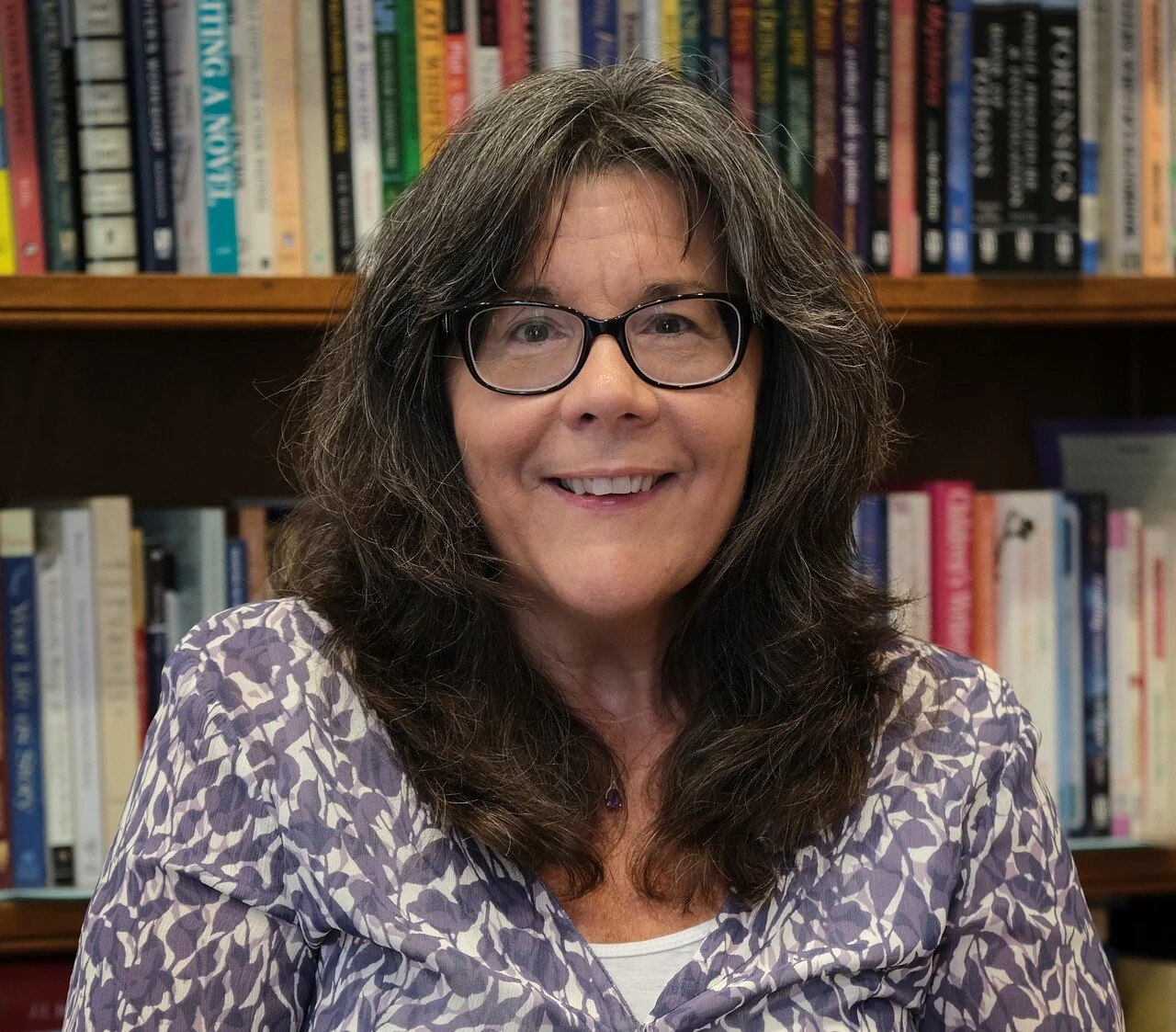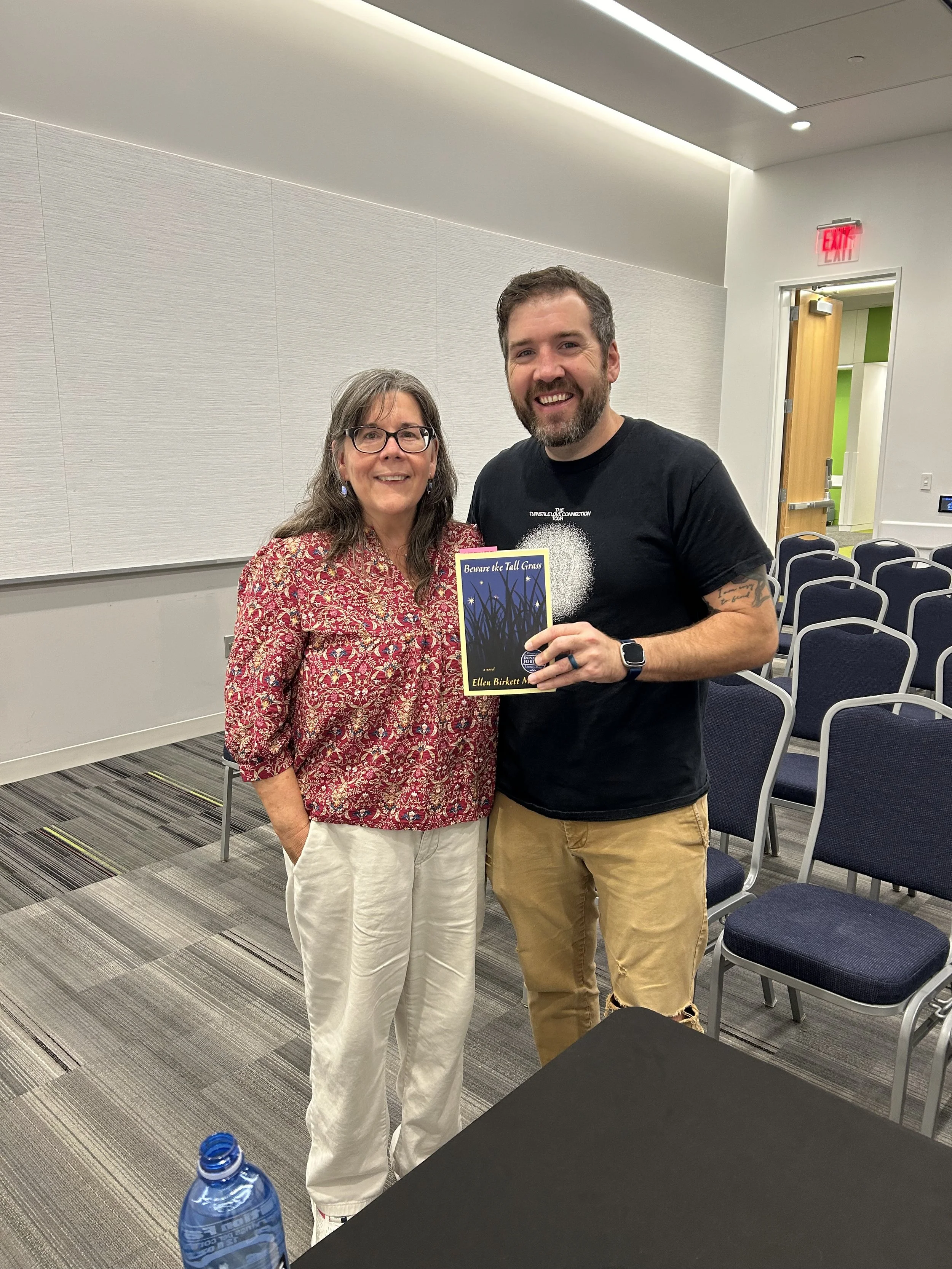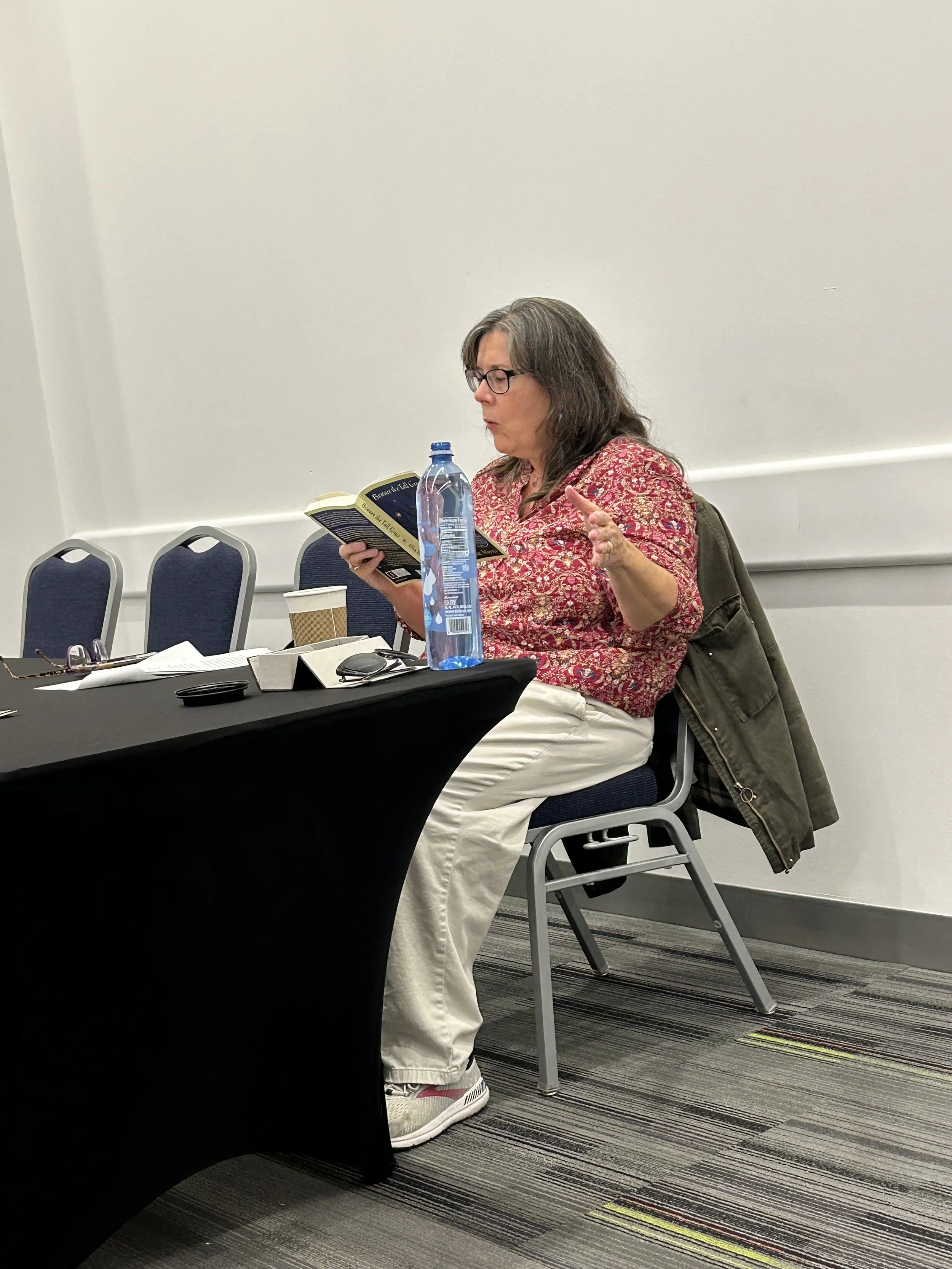A Conversation With Ellen Birkett Morris
“That kind of realness is what I’m after when I’m crafting characters.”
When our oldest son, Ezra, was just three years old, he used to talk of a past life.
At first, it would just come up when we were reading a book together. “Red truck. I used to have a red truck just like this!”
Neither Stacy nor I thought much of it. As new parents, we worried about countless things (Is he eating enough or too much? Should his poop be this color?), we barely had the capacity to take on things happening in this life, let alone past ones.
However, this soon changed when we visited Stacy’s family up near Chicago. Driving past a large factory, smoke billowing from the many chimneys, Ezra pointed out his backseat window. “That’s where I used to work,” his little voice said. “Before I wrecked my red truck and it rolled over and over and over.”
Stacy and I looked at each other. “Oh…yeah?”
“Yeah,” Ezra replied happily. “Old daddy was with me. Daddy, you weren’t my daddy then. I had an old daddy with lines in his face. He was with me when we wrecked my truck on the ice.”
Months passed and from time to time, Ezra continued to talk about his past life, usually in reference to his red truck, his old daddy, and the factory where they worked together. He would also say Stacy was his mom then in his past life, but I wasn’t his dad then. Which no, didn’t bother me, not at all, my feelings weren’t hurt at being left out of this time-jumping, multiple-lives-spanning bond between the two of them. Nope. No jealousy here.
But then Ezra turned four, then five, and one day, Ezra stopped talking entirely about his past life. Now, he’s just a regular fourteen-year-old kid who has been obsessed with classic muscle cars from the 1960s and 70s since he was six months old. Ezra doesn’t remember ever talking about a past life. Stacy and I began to forget too.
All of it came back around though when we met author, Ellen Birkett-Morris at the wonderful Louisville Book Festival in 2023, where as luck (or fate) would have it, Ellen and I shared an author table. In no time, Stacy and I became fast friends with Ellen as we talked about current events, writing, life, marriage, even politics (thankfully aligning there), and, of course, books. In particular, we talked about Ellen’s (at that time) upcoming debut novel, Beware the Tall Grass, which Ellen told us was inspired by an NPR story she had heard about young children having recurring memories of past lives.
Recently, I was able to catch up with Ellen to talk about celebrating successes, overcoming failures, and reckoning with pragmatic thinking versus accepting the supernatural, among other things.
Our conversation follows.
You’ve shared that an NPR story about children recalling memories from past lives led to you writing Beware the Tall Grass, how much time passed between hearing the story for the first time and the beginning of writing? How did the story grow and change during the writing process? Did you experience any periods of writer’s block or moments of self-doubt during that time? If so, how did you push through?
I heard the story and was able to develop a short story based on the idea in about six months. I knew that to write it I had to be laser focused on the character Eve, a mother who wants to give her son a perfect childhood only to find he is marked by disturbing memories of war. I took that short story to a writer’s conference and the instructor said this needs to be a novel. I had never written a novel before and wasn’t sure how I could fill the space, so I created a second point-of-view character named Thomas, who was a 1960s soldier serving in Vietnam. I set myself up with the challenge of explaining how Charlie, the son, and Thomas, the soldier, are connected. Then I built the story section by section seeking to echo themes and language so the reader would feel the connection between the two stories.
It took eight years total and was marked by lots of periods of self-doubt, but I wrote it slowly, sentence by sentence and got a very workable draft. I shared it with writing groups, mentors and ultimately a very helpful developmental editor who helped me get it ready to be published.
I love the dual narrative, alternating chapters; Did you experiment with different structures or points of view?
I needed two characters that had intense desires and strong stakes, and Eve and Thomas fit the bill. I was intrigued by the challenge of conveying the thoughts and emotions of two really different characters and trying to build links to their stories. Once I decided to add Thomas to the narrative I knew I had my structure. I briefly experimented with adding a few sections from the point of view of Eve’s husband Dan but dropped those because they really didn’t fit and they weakened the tension of the dual POV structure without adding anything new.
What were some lessons you learned from writing Beware the Tall Grass that have helped you improve as a writer? Do you have any tips for aspiring writers working on their first novel?
I have a few. Stay with the work long enough for the story to unfold, even if it takes years. Use character as a lens to explore drama and action. People care about characters so you need to make them distinctive and imbue them with strong traits and desires and build a plot that pushes against what they want. Try to find the central image or metaphor for your book and write toward that, mine is the tall grass, where nothing good ever happens.
Ellen and I at the 2024 Louisville Book Festival. You can catch us both there again this fall on October 11th!
From the Vietnam War to studies about children recalling past lives, how much time did you spend researching for this novel? What all did it entail? What were your favorite insights you discovered?
It’s hard to track the time since I did it in fits and starts but I took different approaches from reading about the University of Virginia program and reading We Were Soldiers Once and Young, a fantastic book by a former soldier and his commander to interviewing my uncle about what it felt like to be on the ground during the war to reading blogs written by soldiers and by people who believed in reincarnation. It was sobering to learn about the harsh realities of combat and hard to read about people who sought to exploit those who wished to reconnect with ancestors long gone. All of it was fascinating and I worked hard to filter observations and experiences through the characters so it wouldn’t feel like people were reading a bunch of facts without context.
What were some of the books/movies/music/shows/poetry etc. that helped influence Beware the Tall Grass? Was there a scene from a movie or show that inspired you, that made you say, “That right there is the feeling I’m going for!”? Are there any specific writers or mentors that you looked to for inspiration?
The poems of Yusef Komunyakaa were hugely inspirational. I used a few lines from Confluence as an epigraph:
“I’ve been here before, dreaming myself backwards, among grappling hooks of light. True to the seasons, I’ve lived every word spoken. Did I walk into someone’s nightmare?”
The poem really captured the menacing tone and sense of mystery of the book.
I am inspired by so many writers. In this case, Tim O’Brien is the gold standard for writing about Vietnam. His book The Things They Carried is so powerful. I also remembered the word of my MFA program mentor, Susan Perabo. She critiqued a story I wrote by saying, “I believe these character. They are real to me.” That kind of realness is what I am after when I am writing characters.
One of the central emotional conflicts of this novel is the battle between what is often seen as pragmatic thinking (represented by Dan) and the acceptance of the potentially supernatural (represented by Eve). Often, I find myself going back and forth between both ways of thinking. Which way of thinking do you find yourself aligning with most days? What mystifies you still?
Right now, I am trying to be open to the many forces that can motivate people, whether they are real or not. I think we develop ways of understanding the world that serve our personal psychology and make us feel safe and that was certainly true of Eve and Dan. I am at heart a practical person, but I read horoscopes and feel alarmed when a black cat crosses my path and have some small belief that having a dragonfly or butterfly land on me is good luck and I am not sure why I hold on to these beliefs.
Ellen Birkett Morris reading an excerpt from Beware the Tall Grass during a talk on her writing process and craft.
As a parent, it’s so easy to relate to Eve and her journey as a new parent, especially since, as Stacy and I first shared with you at the Louisville Book Festival in 2023 that our oldest son, Ezra, also used to talk of his past life when he was a toddler. I’m interested, how much of your own personal journey you found reflecting in Eve’s, and, if you’d like to share, was there anything that required a similar leap of faith for you?
I was fascinated when you shared Ezra’s story with me. I have heard so many stories like that since the book came out. I am not a parent, but I drew much of Eve’s advocacy and courage from my own mother’s approach to my challenges. I was born prematurely with a mild case of cerebral palsy and my mother was a fierce advocate for me, finding me the right surgery so I could walk better and making sure I was in public school and could get the best education they could offer. She always focused on my abilities and was a great role model for Eve.
Your book is full of such wonderful prose. My favorite quote comes from page 142: “We have to advocate for the people we love, even when it scares us, even when it takes us places we don’t want to go.” Not only does this line bring life to a belief I’ve had but not known how to properly articulate, it also identifies a (if not the) central theme of Beware the Tall Grass entirely. At what point in the writing did this particular idea/theme come to you? Was it something you were aware of throughout the process, or did it only come about as you dug deeper into the story?
This came as I dug deeper into the story. I start with a premise – a child with past life memories. In order to make that meaningful I had to figure out a way to filter the challenges of that through a character and Eve was my best choice. I gave her a strong desire to give her son a perfect childhood that would push against the idea of a child who already had tremendous baggage. Then I started to imagine how she would deal with this. In the course of making her advocate I was able to articulate that theme. It didn’t occur to me then that it also applies to Thomas and his courage in battle. Thanks for this wonderful question!
Each book’s journey is so unique, and, unfortunately, writers can often face a decent amount of rejection (myself certainly included). I’m always interested to know how writers/creatives persevere, believing in themselves and their stories even when others may not. What was your experience like upon sharing Beware the Tall Grass with those you wished to work with? What was the route like to reach publication?
It was a long road with lots of rejections from agents. When I got an acceptance, the agent tied the book up for a year before we parted ways. There were lots of red flags – he used my query to him to query editors, he didn’t suggest edits, he didn’t tell me when people passed on the book. I was exhausted by that process, so I started sending the book to small presses. When I found the Donald L. Jordan Prize I was excited. They were looking for American stories about integrity and I knew Beware the Tall Grass was a match. The novel was rejected the first time I applied so I hired a developmental editor to make sure it was in good shape. The second time I entered it won the prize. Stick with submitting, work all the angles, see if there is a publisher who fits your niche.
Looking back on the past year since Beware the Tall Grass was released, what are some of your biggest highlights? What were some of the successes that you never saw coming?
Having a national book tour felt like a huge highlight. I reached out to colleagues in cities where I attended workshops, and had friends or relatives. My editor also helped line up some book store events. I never anticipated how great it would feel to talk about the book with students and younger writers. I also loved participating in readings at the AWP Conference and participating in a panel with some esteemed writers at the Virginia Festival of the book.
I was bowled over when Publishers Weekly said this about the book:
“Unnerving, distinctive, and told in fine, intimate prose, Morris's time-crossed novel debut contrasts the present—through the story of Eve Sloan, a mother raising her son in Northern Virginia—and the past, with Thomas Boone, a young man headed for Vietnam in the 1960s. While developing both threads with warm humanity, Beware the Tall Grass builds to an unexpected connection between these characters and eras.”
Writing and releasing a novel is such a huge accomplishment in itself, like climbing Mount Everest, so here I am, asking you, possibly exhausted writer who is still just coming back down, what’s next? Is there another book in the works? How has it been writing in the wake of such a big release?
I have a short story collection that I am sending to small press book competitions and a completed novel that I am sending around to agents. The novel is completely different. It is a romance with a celestial discovery and family/work drama. I hope I can find the right person to represent the book.
Writing has been hard. I am distracted with book promotion and life stuff, but I am managing to work on my short stories and poems. I am hoping to land on the next book idea soon.
Bonus Questions/Top Fives
Who/What are your All Time…
Top 5 Favorite Authors Growing Up?
E.B. White
Roald Dahl
Louise Fitzhugh
Louisa May Alcott
Laura Ingalls Wilder
Top 5 Favorite Authors Now?
Colm Toibin
Elizabeth Strout
Lily King
Louise Penny
Tania James
Top 5 Favorite Bands/Songs?
REM – “Swan H”
Tony Bennett – “You’re All the World to Me”
Neil Young – “Cortez”
Miles Davis – “It Never Entered My Mind”
Janis Joplin – “Cry Baby”
Top 5 Favorite Movies?
North by Northwest
The Conversation
Avalon
Perfect Days
Spy
Top 5 Favorite TV Shows of All Time?
Rockford Files
Ted Lasso
Mary Tyler Moore Show
The Good Place
Would I Lie to You
What Do You Believe is More Likely to Exist, Ghosts or Aliens?
Aliens, the cosmos is so big!
What’s One Paranormal Thing That You Kind of Believe?
I am a sucker for horoscopes, especially the cool ones like Free Will Astrology.
What’s the Last Thing That Made You Really Mad?
Any of the latest outrageous foolishness from the current administration.
Definitely agree there. What’s the Last Thing That Made You Laugh?
My husband makes me laugh multiple times a day. He just said he was going to wear a muscle shirt to a fancy event. He doesn’t own one. What a goof.
What’s Something You’re Currently Looking Forward To?
Finding a home for my next book and taking the next trip with my husband.
What Gives You Hope?
This makes me sound ancient, but young people today and their creativity and inclusiveness and desire to follow their own paths.
Fantastic answer.
Thanks Ellen! I will see you at the Louisville Book Festival this fall!
Ellen Birkett Morris is the author of Beware the Tall Grass which can be found online wherever books are sold or requested at your local library. You can follow Ellen online at www.ellenbirkettmorris.com.


